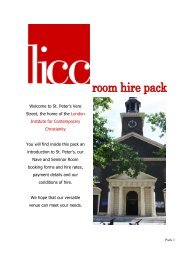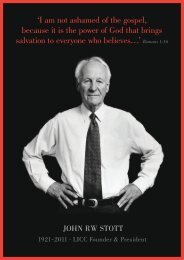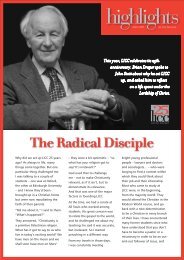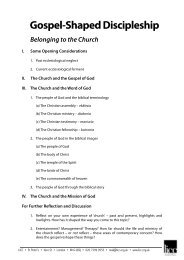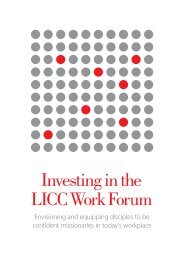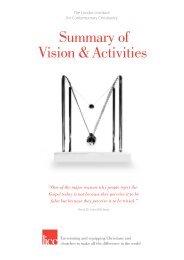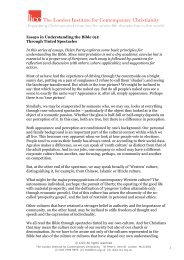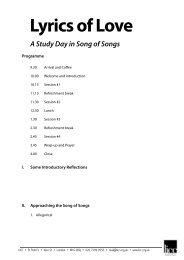Blessing â Understanding it and Praying for it - The London Institute ...
Blessing â Understanding it and Praying for it - The London Institute ...
Blessing â Understanding it and Praying for it - The London Institute ...
Create successful ePaper yourself
Turn your PDF publications into a flip-book with our unique Google optimized e-Paper software.
<strong>and</strong> sacrificial offering. W<strong>it</strong>h the priest’s blessing comes the guarantee that<br />
atonement has been successful, making the final blessing an essential component of<br />
the worship, confirming God’s favourable att<strong>it</strong>ude to his people, serving as a<br />
reminder that his presence is w<strong>it</strong>h them, to bless them.<br />
<strong>The</strong> priestly blessing is specified in Numbers 6:22-27:<br />
‘<strong>The</strong> LORD said to Moses, “Tell Aaron <strong>and</strong> his sons, ‘This is how you are to bless<br />
the Israel<strong>it</strong>es. Say to them:<br />
“<strong>The</strong> LORD bless you <strong>and</strong> keep you;<br />
the LORD make his face shine on you <strong>and</strong> be gracious to you;<br />
the LORD turn his face toward you <strong>and</strong> give you peace.”’<br />
“So they will put my name on the Israel<strong>it</strong>es, <strong>and</strong> I will bless them.”’<br />
<strong>The</strong> source of the blessing is clear: <strong>it</strong> is the Lord himself – seen in the threefold<br />
repet<strong>it</strong>ion of his name in the blessing <strong>it</strong>self, <strong>and</strong> confirmed in the final phrase (‘So<br />
they will put my name on the Israel<strong>it</strong>es, <strong>and</strong> I will bless them’). This strong link<br />
between God’s covenant name <strong>and</strong> the blessing of his people is also promised in<br />
Exodus 20:24, where <strong>it</strong> is connected w<strong>it</strong>h appropriate means of atonement. Although<br />
the blessing comes only through the Lord God, <strong>it</strong> is the priests – in a functional <strong>and</strong><br />
representative role – who mediate <strong>it</strong> to the people. It may be seen as a prayer <strong>for</strong><br />
God’s blessing <strong>and</strong> protection, his approval <strong>and</strong> grace, his attention <strong>and</strong> peace – a<br />
prayer which is promised to be effective – ‘I will bless them’ (6:27).<br />
<strong>The</strong> priestly blessing is alluded to in several psalms (e.g., 29:11; 115:12-15;<br />
134:3). Psalm 67, <strong>for</strong> example, begins: ‘May God be gracious to us <strong>and</strong> bless us <strong>and</strong><br />
make his face shine on us’ (67:1). But the blessing, in this case, is sought not <strong>for</strong> <strong>it</strong>s<br />
own sake or <strong>for</strong> the sake of Israel, but <strong>for</strong> all peoples, as seen in the next line of the<br />
Psalm – ‘so that your ways may be known on earth, your salvation among all<br />
nations’ (67:2) – w<strong>it</strong>h the Psalm expressing the hope that God’s blessing will become<br />
a global real<strong>it</strong>y. While Psalm 67 reflects on the ‘blessing’ part of the priestly<br />
benediction, Psalm 121 echoes the ‘keeping’ part, w<strong>it</strong>h <strong>for</strong>ms of that word appearing<br />
six times in this Psalm of Ascent. <strong>The</strong> Lord watches over his people not just on their<br />
occasional journeys, or even on the physical ascent to the temple in Jerusalem, but<br />
‘now <strong>and</strong> <strong>for</strong>evermore’ (121:8).<br />
<strong>The</strong> blessing promised in Numbers 6 is rein<strong>for</strong>ced by the account of Balaam in<br />
Numbers 22-24. <strong>The</strong> king of Moab hired Balaam to curse the people of Israel<br />
(22:4-6); but each time Balaam opened his mouth, he blessed them instead of cursed<br />
them (Num. 23:8, 20; 24:9-10). Balaam, in sp<strong>it</strong>e of his skills <strong>and</strong> renown as a<br />
prophet, was powerless to bless or curse Israel w<strong>it</strong>hout the Lord’s direction (cf. Deut<br />
23:4-5; Josh. 24:9-10; Neh. 13:1-2). It’s a strong indication that no magic or r<strong>it</strong>uals<br />
will make a difference; the author<strong>it</strong>y to bless belongs to the Lord who cannot be<br />
coerced.<br />
<strong>The</strong> way of obedience<br />
According to Exodus 23:25-26 <strong>and</strong> Deuteronomy 7:11-15, God promises to<br />
bless his people if they are obedient to him <strong>and</strong> provide them w<strong>it</strong>h everything<br />
necessary <strong>for</strong> their well-being in the l<strong>and</strong>. <strong>The</strong> blessings are articulated more fully in<br />
Deuteronomy 28:1-14 (cf. Lev. 26:1-13), providing a picture of the blessed life as<br />
bound up w<strong>it</strong>h the provision of food <strong>and</strong> water, children <strong>and</strong> crops, farming <strong>and</strong><br />
fertil<strong>it</strong>y, defeat of enemies <strong>and</strong> long life in the l<strong>and</strong>. <strong>The</strong> establishment of the<br />
covenant flows out of God’s undeserved love <strong>for</strong> the people (Deut. 7:7-8), but the<br />
promise of blessing seems cond<strong>it</strong>ional on ongoing obedience to the covenant<br />
stipulations (7:11-15; 11:8-15; 28:2), while disobedience causes a breakdown of the<br />
LICC • St Peter’s • Vere St • <strong>London</strong> • W1G 0DQ • 020 7399 9555 • mail@licc.org.uk • www.licc.org.uk



